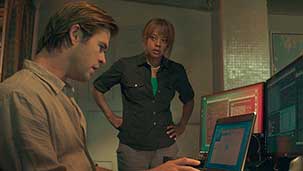Hollywood films love their technical advisors, be they military, science, or in your case, criminal. But being a technical advisor on a Michael Mann film must be a different kind of gig. The characters in Mann’s films are defined through their action—for Mann, action is character. And since much of the action of Blackhat, exists in the netherworld of computer hacking, your expertise was no doubt essential in helping Mann create this very meticulous world.
Despite Mann’s pedigree, Blackhat presents a problem that has flummoxed filmmakers for decades: How do you make a person sitting in front of a computer screen seem exciting, even cinematic?
Based on most of Blackhat, Mann’s answer seems to be that you don’t—or, at least, that you don’t try too hard. He’s a savvy enough storyteller to know that the drama in any scene is about the shifting power dynamics between characters. Two men punching each other in a boxing ring, a gang of bank robbers shooting their way down an L.A. street, or a group of journalists simply trying to determine the legal ramifications of tortious interference can all create the same electricity for Mann, because what’s happening, no matter how small, matters to the characters.
I say “most of” Blackhat because its opening scenes had me worried that Mann no longer trusted the audience—or himself—to experience action through character. As the film opens, we are assaulted by some pretty standard CGI-crafted shots that zoom in and out of computers, zipping along circuit boards, pushing almost to the atomic level in an attempt to visualize semiconductors coming to life in a mainframe as it is hacked by, well, by someone like you. I assume none of this sequence fell under your technical advisory, as it’s not very effective and more than a little silly. It had me worried that Mann had bought into the overpraise of special effects that a furious light and sound show could better deliver what a simple edit could convey: action and reaction. A man taps a keyboard, and somewhere on the other side of the world in China, a nuclear power plant’s cooling fan overheats and causes a meltdown. Anything in between those two events is only noise, reducing their impact. To see a filmmaker whose style is known mainly for its austere beauty fall victim to this at the film’s outset was disheartening.
Thankfully that’s the only such indulgence in Blackhat, and after that opening scene, we move quickly into territory Mann is familiar with: criminals and the people who hunt them. Even though Blackhat purports to be about your world’s particulars, it’s really about what all of Michael Mann’s movies are almost always about: the hunt.
And while Blackhat might seem perfectly timed —especially for those of you in the Hollywood cyber security business— Mann has never been particularly interested in timeliness as much as he has been interested in his own pet themes; loyalty, friendship, vengeance. And although it is a film that takes place in a very modern world, Blackhat feels most aligned with Mann’s 1981 debut film, Thief. Structurally, these films are about as close to each other as anything Mann’s made (not counting his fill-in remake of 1989’s L.A. Takedown as 1995’s Heat).
Chris Hemsworth plays Nick Hathaway, an incarcerated hacker who is the only person who can possibly track down the mysterious man glimpsed in Blackhat’s opening sequence. After the aforementioned nuclear reactor meltdown, Hathaway’s old college dorm mate who just happens to be a high level Chinese officer, convinces the United States government to free Hathaway (with a full pardon, of course) if he can help the authorities find and catch their man. When it comes to crime thrillers—even techno crime thrillers— the ground doesn’t come more well-trod than this.
Mann takes pleasure in showing a seasoned team of professionals excel at their craft. He takes the same strategy when directing actors, but the results are mixed. Some of the more famous faces, like Viola Davis’, take underwritten roles, and create characters that make an impression even when their place in the plot is a little too obvious. Other key roles suffer. Taiwanese actress Wei Tang benefits from Mann’s love of quiet moments, and though she’s an appealing screen presence and clearly talented, at times it sounds as if she learned the script phonetically. Hemsworth is solid, if unexceptional, as Hathaway, valiantly channeling his inner James Caan, but never matching the much-needed charisma of Mann’s best leading men. Yet for all its faults, and reliance on cliché, Blackhat manages to stay its course.
Treading that edge between cliché and nuance is something Mann’s done throughout his directing career. He’s not afraid to write his themes in bold and then mark them with a highlighter. And if you’re not on Mann’s wavelength, it can be disastrous; earnestness becomes comical, big moments fall flat. But if you are in sync with him, a lot can be forgiven when those emotional highs lift you up. For a movie set in the impersonal world of computer hacking, and structured around the most familiar of genre conventions, Blackhat succeeded for me—if only in a minor way—when it became truly personal. Its climactic scene is rooted in the low-tech in a very up-close-and-personal confrontation that unfolds amid what’s filmed to look like waves of humanity. It climaxes about as far away from cyberspace as possible.
Ironically, it was only when your technical contributions—authentic as I’m sure they were—faded out of view that Blackhat worked for me.
Sincerely,

Casey







